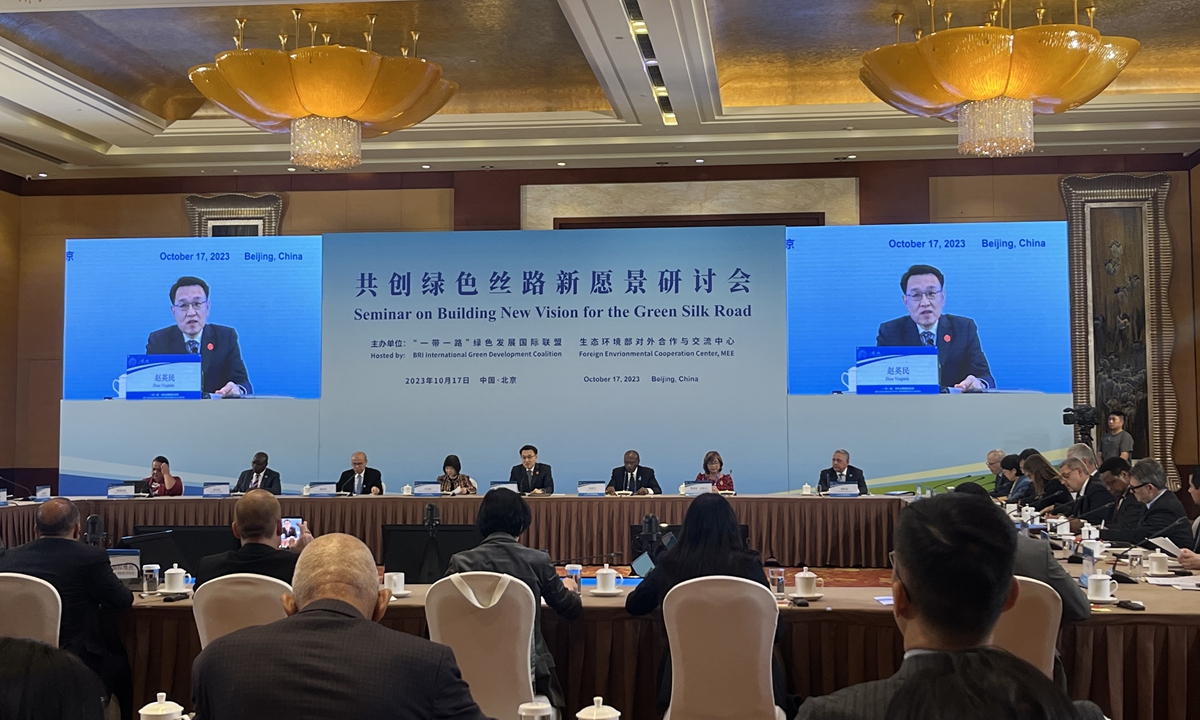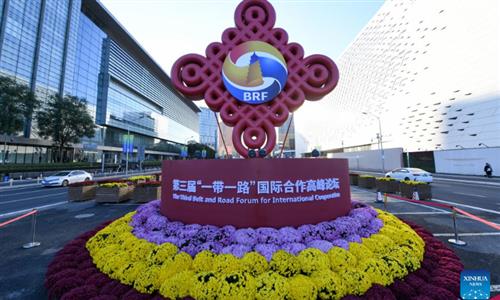BRI produces fruitful results in global green devt with joint effort: senior official

The Seminar on Building New Vision for the Green Silk Road, October 17, 2023, Beijing Photo: Xu Keyue/GT
With the joint efforts of all parties, the achievements of green development in various fields of the Belt and Road Initiative (BRI) have been fruitful, making contributions to global green development, Zhao Yingmin, vice minister of the Ministry of Ecology and Environment, said at the Seminar on Building a New Vision for the Green Silk Road on Tuesday during the third Belt and Road Forum for International Cooperation (BRF) in Beijing.
Senior officials on environment, economy and development from countries including Singapore, the Dominican Republic, Myanmar and experts and scholars from BRI partner countries attended the seminar. The BRI is marking its 10th anniversary.
Over the past decade, China has always adhered to the concept of green development, advocating consultation, joint construction and shared benefits, Zhao, also convener of the Advisory Committee of the BRI International Green Development Coalition (BRIGC), said at the seminar.
In today's world, severe challenges of peace deficit, development deficit, security deficit, and governance deficit are facing all mankind. Among the 169 specific goals included in the United Nations' 2030 Agenda for Sustainable Development, only 15 percent of the goals are on track, and many goals are regressing, Zhao noted.
In response to global development and the expectations of all countries, the BRI has brought new hope to the world, added new impetus to new global development, created a new platform, and contributed Chinese wisdom and solutions to global governance.
First, we have been continuing to build a "national business card" for participating in global environmental governance, jointly establishing the BRIGC, an ecological and environmental big data service platform, and the BRI environmental technology exchange and transfer center. Up to now, the Green Coalition has gathered more than 150 domestic and foreign partners, held more than 70 thematic events, and published more than 20 policy research reports, providing important policy decision-making support for the construction of a green Belt and Road, according to Zhao.
Zhao continued that under the BRI, the Lancang-Mekong River Environmental Cooperation Center,and the China-Cambodia and China-Africa environmental cooperation centers were established. Under cooperation mechanisms such as China-ASEAN and Shanghai Cooperation Organization, more than 20 forums and seminars are held every year, with thousands of participants from countries and regions participating in exchanges.
The senior Chinese official revealed that by actively leveraging the role of big data platforms, more than 60 basic environmental information from BRI partner countries and more than 40 environmental laws, regulations, and standards of BRI partner countries have been collected to provide green development solutions for foreign investment.
In addition, major projects such as the Mombasa-Nairobi Railway, Jakarta-Bandung High Speed Railway and China-Laos Railway have been launched, extensively integrating China's green technologies and concepts. For example, in the construction of the China-Laos Railway, there are animal passages or extended tunnels, which effectively facilitate economic prosperity and protect wild animals and their living environment and enhance local awareness and the ability to protect natural ecology. Also, the BRI has helped countries such as Kazakhstan, Ethiopia, Argentina, Vietnam and Montenegro develop photovoltaic and wind power projects, promoting the energy low-carbon transformation of BRI partner countries, Zhao noted.
According to Zhao, China's financial and technological support has provided strong impetus for the optimization of Pakistan's energy structure. The construction of more than 10 large power plants, such as the Karot Hydropower Plant, has provided Pakistan with cheap and stable electricity supply, transforming it from a country with power shortages to a country with abundant power. Also, while announcing the cessation of overseas coal-fired power projects, China has provided hundreds of millions of dollars in funding support for Ethiopia's hydropower projects through green investment, helping developing countries in Africa and elsewhere overcome development bottlenecks and promote low-carbon energy transformation.
Frank Rijsberman, director general of the Global Green Growth Institute (GGGI), who attended the seminar, revealed that they have interviewed government officials from 24 countries which cover a total of 104 BRI projects, involving a total investment amount of $150 billion. Among the $150 billion BRI projects, 25 percent are classified as deep green projects, which is remarkable, and 7 percent are classified as mild green projects, including hydropower, water supply and irrigation projects.
That is to say, at least one-third of the 104 BRI projects we studied are green projects, which is very impressive, Rijsberman noted. He told the Global Times on Tuesday that they learnt that more and more countries have expressed their willingness to work with China on renewable energy, energy storage, green buildings, green finance and in other areas.


